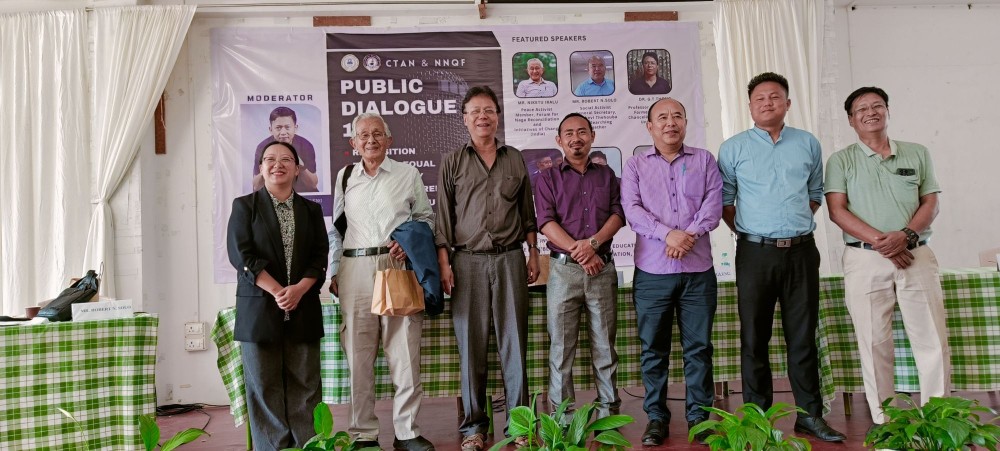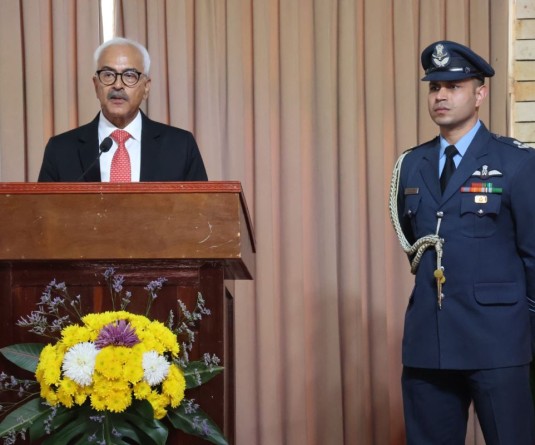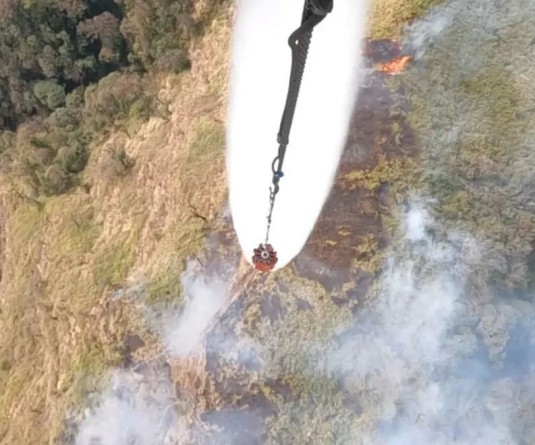Featured speakers at the CTAN-NNQF Public Dialogue at AWO Hall, Kohima on June 7.

CTAN-NNQF public dialogue held in Kohima
Morung Express News
Kohima | June 7
Peace activist Niketu Iralu, a member of the Forum for Naga Reconciliation and Initiatives of Change (India), lauded the Combined Technical Association of Nagaland (CTAN) and the Nagaland Net Qualified Forum (NNQF) for creating space for public dialogue, stating that “only by doing so, by responsible persons, the future will be shaped.”
Speaking at the CTAN-NNQF Public Dialogue on the 147 issue at the Angami Women Organisation Hall in Kohima on June 7, Iralu described CTAN and NNQF as the “great rising generation of the Nagas.” He said that “our problems, our difficulties and our complaints are meant to change us and take us forward instead of fragmenting us and making us hate one another.”
He reflected on the prolonged protest, acknowledging that it revealed “deep concern, frustration, bitterness and outraged anger but also belief in those who conducted the most demanding, costly protest and equally in those who questioned or opposed it.” Both sides, he affirmed, “are serving a vital purpose for the difficult growth of our young society.”
He said that the central issue at stake—shared by all parties “damaged in different ways”—is the urgent need for government and society to implement “Due Process” in an unchallengeable manner. “Due Process is ultimately where both sides are trying to make a point, whereby justice and fairness for all are seen to be achieved in the governance and development of society,” he said.
Iralu also described problems, difficulties, and differences as “our wealth and common asset,” and part of God's plan for growth.
‘Injustice in different ways’
Highlighting the universality of injustice in Naga society, GB and social activist Kahuto Chishi stated, “we have to understand that this is happening in every aspect of the Naga society,” whether in towns or villages, and among the educated or uneducated.
“We are all facing injustice in different ways,” he reiterated, urging Nagas to recognize the problem. He stressed the need to move beyond tribal divisions and adopt the principle that “what is right is right and what is wrong is wrong.”
Calling attention to the present issue, he said, “this is the first time that our educated young people have stood for an issue,” and added, “Let us fight together and hope that the government requisitions these posts to NPSC.”
‘Silence encouraging corruption’
Retired professor and former pro-vice chancellor of Nagaland University, Prof. G.T. Thong, said that years of public silence have enabled corruption. “It is our silence that has been encouraging corruption over the years,” he stated.
However, he expressed hope that the CTAN-NNQF movement is just the beginning. “We hope to see this movement growing in huge proportions not allowing our government to continue in their old ways,” he said.
Thong also drew attention to the deteriorating condition of government colleges and the shortage of teachers, partly due to reservation policies.
He urged the government to “wake up,” stating, “the key to growth is knowledge generation, and at the heart of knowledge generation is research.” Higher education in Nagaland, he stressed, must be upgraded through a combination of strong academics and intensive research. “We expect all the major colleges to be upgraded,” he added.
‘A small tablet that will heal Nagaland’
Social activist Robert N. Solo, general secretary of Kezekevi Thehouba and Searching Together, explained his support for CTAN-NNQF, saying, “we found that they were not fighting for anything personal.”
Calling the 147 issue “a small tablet that will heal Nagaland,” he warned, “if we fail this time, we don’t have any future.”
The state government has revoked the order regularizing 147 ad hoc posts in the Department of Higher Education. CTAN-NNQF is now demanding that these posts be requisitioned to the Nagaland Public Service Commission (NPSC).
Solo said the protests have been peaceful and urged the government not to provoke young people. “What has happened to us should not happen to the future generations,” he said. “I don't want to see our children, our brothers and sisters on the street again.”
‘Order revoked but problem is requisition’
CTAN Convenor Er. Meshenlo Kath reiterated that while the regularization order has been revoked, the main issue remains the requisition to NPSC. “Why is the requisition so difficult to send?” he asked.
He criticized NPSC as being outdated and claimed that “it is high time for them to get updated.” According to him, NPSC lacks subject experts and relies on outsiders to set examination questions. “There are enough qualified people who can set questions,” he said.
Dr. Videkhono Yhokha, member of the NNQF Core Committee, also called for fair recruitment and criticized the current marks assessment framework for placing too much weight on academic records without considering differences across boards and institutions. She urged a reassessment of the Marks Weightage Framework to uphold the meritocratic spirit of the Common Educational Services Examination (CESE).
The CTAN-NNQF Public Dialogue on the 147 issue was held under the theme “Share your voice, shape your future” and was moderated by R. Lungleng from The Lungleng Show.





